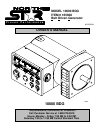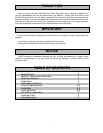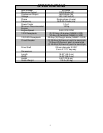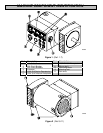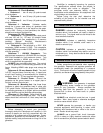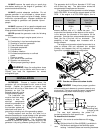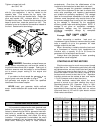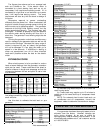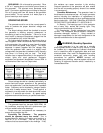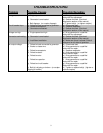
4
GENERATOR FEATURES
References 1-3 Circuit Breakers.
• Reference 1 - two 40 amp (A) push-to-reset
circuit breakers.
• Reference 2 - one 30 amp (A) push-to-reset
circuit breaker.
• Reference 3 - two 20 amp (A) push-to-reset
circuit breakers.
Reference 4 - Voltmeter. Voltmeter needle
should be in green area during all generator load
conditions. The black line in the center on the green
area is 120V. During no load conditions, the needle
should be at or above the black line.
References 5-6 120V Receptacles.
• Reference 5 - The generator has a side panel
with two 120 volt (V) 20 amp (A) straight blade
receptacle duplexes (two receptacles in a common
housing). National Electrical Manufacturer’s
Association (NEMA) number is 5-20R.
• Reference 6 - This twistlock is a 120V 30A
receptacle, NEMA number L5-30R. This receptacle
accepts NEMA plug number L5-30P, which is supplied
with the generator.
Reference 7 - 120/240V Receptacle. This
straight blade receptacle is 120/240V 50A, but has two
40A ci rcui t brea kers to l imi t m axim um current. T hi s
receptacle accepts a NEMA plug number 14-50P,
which is supplied with the generator.
ALWAYS use grounded male plugs. The neutral
line of the generator is mechanically grounded to the
frame. Matching NEMA male plugs must always be
used.
Reference 8 - 28 mm diameter Shaft. The shaft
is 2.375” long and has a 8 mm key way. A taper bore
or split bore bushing is recommended for attaching
sheaves. 8 mm X 1.75” key supplied with generator.
Reference 9 - Ground Screw. Ground the
generator via the ground screw, to a copper pipe or
rod that is driven into moist soil.
Reference 10 - Mounting feet. Use these three
locations to attach the generator head in place with
7/16” grade 5 bolts. Mounting plates (item #165935)
for mounting generator to a cement pad are available
through Northern and the NorthStar parts catalog.
Reference 11 - Fan Vents. Never block the vent
slots or insert objects through the slots. The closest
object should be a minimum of 3 feet away from the
vents.
INTRODUCTION
Before attempting to mount your generator,
thoroughly study the instructions and cautions in this
manual to assure you are fully acquainted with the
operation of all components of this generator. Proper
preparation, operation and maintenance will result in
operator safety, best performance and long life of the
generator.
NorthStar is constantly improving its products.
The specifications outlined herein are subject to
change without prior notice or obligation. The
purchaser and/or user assumes liability of any
modification and/or alterations on this equipment from
original design and manufacture.
Before using, the user shall determine the
suitability of this product for its intended use and
assumes liability therein.
ANSI SAFETY DEFINITIONS
DANGER indicates an imminently hazardous
situation which, if not avoided, will result in death or
serious injury. This signal word is to be limited to the
most extreme situations.
WARNING indicates a potentially hazardous
situation which, if not avoided, could result in a
death or seri ous i nj ury.
CAUTION indicates a potentially hazardous
situation, which if not avoided, may result in minor or
moderate injury. It may also be used to alert against
unsafe practices.
RULES FOR SAFE OPERATIONS
Safety precautions are essential when operating
this generator. Respectful and cautious operation will
considerably lessen the possibilities of a personal
injury. This manual will warn of specific personal injury
potential, and these will be designated by the symbol:
WARNING This generator is equipped
with a grounding screw, located on the generator
frame for your protection. Always complete the
grounding path from the generator to a copper
pipe/rod that is driven into moist earth, to prevent
electrical shock.
ALWAYS use electrical cords that are in good
condition. Worn, bare, frayed or otherwise damaged
cords can cause electric shock.
NEVER operate the generator, or handle any
electrical equipment while standing in water, while
barefoot, while hands are wet or while in the rain or
snow. Electric shock may result.
ALWAYS use a ground fault circuit interrupter
(GFCI) in damp or highly electrical conductive areas
and on construction job sites to prevent electric shock.



